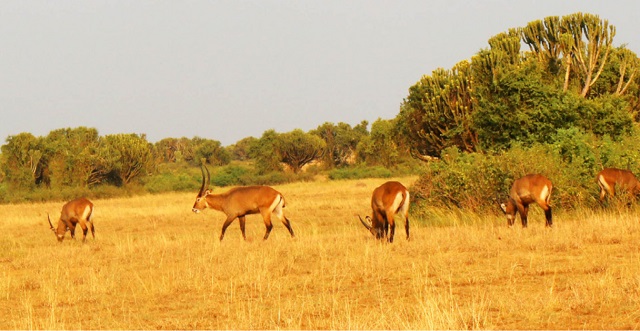
Among winning projects is a community bee-keeping project in western Uganda
Kampala, Uganda | RONALD MUSOKE | Frontline communities that live adjacent to Queen Elizabeth National Park are among the beneficiaries of a US$400,000 (Shs1.5bn) conservation grant meant to support wildlife-based tourism communities that have been devastated by the ongoing COVID-19 pandemic.
Queen Elizabeth National Park is one of Uganda’s most popular parks which attract thousands of tourists every year. But travel restrictions that were imposed by the government early this year to slow the pandemic have depleted economic lifelines for the people and conservation activities in wildlife-rich areas, with iconic species such as elephants.
In Uganda, tourism is the leading foreign exchange earner. Last year, official figures from the Ministry of Tourism, Wildlife and Antiquities show that the industry earned the country up to US$ 1.5bn or about 9% of GDP. The industry also employs about 670,000 Ugandans including hoteliers, porters, cooks, guides and cleaners.
To cushion some of the negative impacts of COVID-19, an initiative of Lion’s Share, an award-winning initiative led by the United Nations Development Programme (UNDP) and a coalition of global businesses and UN partners, was launched in April this year to fund projects of people who live in the vicinity of these conservancies with theaim ofbuilding alternative sources of income.
While announcing the winning projects on Sept. 08 in New York, Achim Steiner, the UNDP administrator noted that the spread of COVID-19 is a socio-economic, environmental, and governance crisis as much as a health crisis. Steiner said this is a stark reminder that human health and well-being is intrinsically linked to the health and well-being of the planet.
“We will recover from this crisis, but we must use this opportunity to build back a more equal, inclusive, sustainable, safer and healthier planet,” Steiner said.
The announcement of the winning projects came on the heels of Antonio Guterres, the United Nations Secretary-General’s call to transform the tourism sector to become more resilient, inclusive and sustainable. Guterres warned that the impacts of COVID-19 on tourism threatened to increase poverty and inequality, as well as reverse nature conservation efforts.
The grants will fund up to 40 local projects through development of skills and alternative sources of income, including cheese making in the snow leopard steppe of Mongolia, sustainable fish farming in Zambia, permaculture training in Nepal and virtual tours in Bhutan.
Among the winning projects is a community bee-keeping project in Queen Elizabeth National Park in western Uganda which is a man and biosphere reserve— meaning that human activity is permitted to go on alongside conservation.
Other projects include; permaculture gardens and elephant-human conflict reducing chili fences in Namibia; support to the Black Mambas – the world’s first all-female anti-poaching unit – in bee-keeping and permaculture to reduce human-elephant conflict in South Africa; sustainable agriculture and natural medicinal knowledge to support the Achuar indigenous community in the Amazon Rainforest of Ecuador; and training sea turtle anti-poaching rangers, and community livelihoods and education in Sri Lanka.
All the 40 project locations support endangered species while more than half of all the projects are based in locations where multiple endangered and critically endangered species are present.
According to UNDP, investing in these crucial wildlife areas and supporting jobs and livelihoods in these local communities foster green growth. They address future economic risks by contributing to tackling climate change and biodiversity loss; safeguarding natural ecosystem services, such as clean water, crop pollination, and more; and reducing the risk of new zoonotic diseases emerging with the potential to become pandemics.
“We are extremely grateful for the support offered by the Lion’s Share,” said Dr. Michelle Henley, the co-founder, CEO and principal researcher of Elephants Alive – one of the funding recipients.
“This grant will enable us to up-skill the Black Mamba Anti-Poaching Unit to keep bees and grow permaculture, so that these women who are critically involved in protecting our wildlife can supplement much-needed income.
This proof of concept in South Africa will then be implemented in vital elephant corridors, ensuring that living with elephants can be viewed as a bonus and not a burden to local people,” Henley said.
****
 The Independent Uganda: You get the Truth we Pay the Price
The Independent Uganda: You get the Truth we Pay the Price


